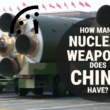No-first-use: One step toward peace
By Ta Minh Tuan, October 24, 2016
Most nuclear weapons states haven't declared no-first-use policies. Achieving universal no-first-use appears impossible. So why should Washington renounce the first use of nuclear weapons?
This is the main argument advanced in Round Two by my roundtable colleague Raymund Jose G. Quilop. I would answer him with my own question: If, throughout the nuclear era, nuclear weapon states had always continued developing nuclear arms for their own security, ignoring international calls for reductions in nuclear risk, how could instruments such as the Nuclear Non-Proliferation Treaty (NPT), the Comprehensive Test Ban Treaty (admittedly, not yet in force), START I, and START II ever have been negotiated? Without these treaties, the marked reductions in nuclear stockpiles that the world has witnessed over the last 30 years would never have come to pass.
Where a technology as destructive as nuclear weapons is concerned, someone must take the first step. Nations that sign on to a treaty such as the NPT do so in the belief that other nations will do likewise for the sake of international peace. Over the years, this attitude has largely been rewarded.
To be sure, countries such as North Korea, Israel, and Pakistan have refused to join (or have withdrawn from) some of the most important treaties. But what if Washington, Beijing, and Moscow withdrew from their international nuclear commitments on the grounds that these few nations remain unbound by the NPT? Should Washington, Beijing, and Moscow wait for universality before they place any limits on their nuclear activities—and if they did, what would the consequences be? In reality, these powers have played major roles in pushing for nonproliferation and limits on nuclear arsenals. If they had merely taken a wait-and-see attitude, there would be no major nuclear agreements at all.
So why must Washington wait for other nuclear weapon states to declare no-first-use policies in order to do so itself? A no-first-use declaration by a superpower such as the United States would only increase US prestige and would set a good example for other nuclear weapon states. Arguing in favor of US nuclear ambiguity only means accepting a chicken-or-the-egg status quo.
Parris Chang, meanwhile, argues that Tokyo and Seoul "might well go nuclear themselves" if the United States renounced the first use of nuclear weapons. But the international security system, including in East and Southeast Asia, does not rely on the nuclear weapon states' willingness to execute a first strike. It doesn't even rely on the use of nuclear weapons. Instead, the international security system depends on respect for and exercise of national commitments and international law. In addition, Washington's extended nuclear deterrence policy simply means that the United States is ready to use nuclear weapons to protect its allies if necessary. Extended deterrence might sometimes imply the first use of nuclear weapons, but in no sense does it guarantee first use. First use is not embedded in extended deterrence—and I do not believe that US allies such as Japan and South Korea are insisting that it be otherwise. First use or no-first-use—either way, it doesn't affect Washington's security commitments to its allies at all. No one in Japanese or South Korean policy-making circles could perceive a US no-first-use policy as, to quote Chang, an "indication that the United States might be retreating from its nuclear guarantees." Extended deterrence should not be confused with maintaining the possibility of first use; confusing the two leads to misleading conclusions. In the same vein, I perceive no tangible connection among no-first-use, Asia's territorial disputes, and—as Chang phrases it—China's "increasingly aggressive behavior in the South and East China Seas."
A US no-first-use policy would not bring an end to the grave threat that nuclear weapons pose. But it would certainly qualify as a serious confidence-building measure and a step toward a more peaceful world.
Topics: Nuclear Weapons
Share: [addthis tool="addthis_inline_share_toolbox"]














